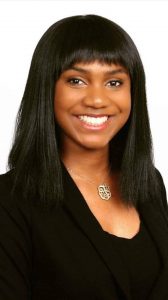OXFORD, Miss. – For the third straight year, a University of Mississippi alumna has emerged as a top contender for the prestigious Rhodes Scholarship.
Chinelo Ibekwe, a 2018 chemical engineering graduate, is a finalist for the prestigious award. The Nigeria native was a 2017 semifinalist for the Rhodes Scholarship for West Africa while completing her senior year at Ole Miss. After graduation, she reapplied and was named a 2018 finalist for the award and took third place.
“The Rhodes application cycle has been an interesting journey for me, and I have watched myself grow with each cycle,” Ibekwe said. “It’s such a competitive process that it forces you to dig deeper into how effective your career path connects with standing up for the world.”
If Ibekwe wins the scholarship, she will apply for postgraduate data science degrees at the University of Oxford. While she hasn’t chosen her research yet, Ibekwe said she is looking forward to connecting with Matt Willis, a research associate at the Oxford Internet Institute at the University of Oxford, to learn more about the institute’s work on the automation of repetitive tasks in medical care delivery.
She is also excited to connect with researchers at the Oxford Big Data Institute, focused on implementing data-driven research in clinical medicine and population health.
“I want to learn the fundamentals of analyzing unstructured data on human behavior, which will serve as a foundation for my career in artificial intelligence for health care,” said Ibekwe, who works for Corporate Council on Africa to foster partnerships between U.S. companies and African governments. She is also pursuing coursework in data science and AI to equip her to address Nigeria’s health care infrastructure challenges.
“I am interested in how behavioral health data could influence medical innovations,” she said.
Ibekwe said the Rhodes would give her an opportunity to connect with well-rounded leaders passionate about tackling complex global problems such as health care. Long term, she plans to use technology and investment to revitalize the health sector of Nigeria.

Chinelo Ibekwe, a 2018 University of Mississippi chemical engineering alumna, is a finalist for the Rhodes Scholarship for West Africa. Submitted photo
“With the state of bureaucracy in the Nigerian Ministry of Health, change makers are beginning to disrupt the health sector through private sector innovations,” she said. “Hence, I plan to start an artificial intelligence company, which will improve clinical, financial or operational outcomes needed to upgrade population health and accountable care in Nigeria.”
Although AI is revolutionizing health systems worldwide, lack of good quality data is a major obstacle preventing developing countries from fully implementing it, Ibekwe said.
“Only a small percentage of the world’s medical data is available in a form that AI machine-learning algorithms absorb,” she explained. “Therefore, to explore AI, there is a need to understand how to acquire and manipulate big data, which is why I am applying to study data science at Oxford.”
Ibekwe said she needs the scholarship because her parents are unable to afford University of Oxford’s fees. She was able to afford college only after Ole Miss awarded her a full-tuition scholarship.
Ibekwe’s undergraduate honors thesis was a systematic review of socioeconomic literature on breastfeeding support programs, and the impact of breastfeeding on reduced rehospitalization of preterm and low-birth-weight babies in the Mississippi Delta.
While in college, she interned at Mars Inc., Goldman Sachs and Medtronic. Ibekwe also spent some of her school breaks shadowing physicians at Johns Hopkins University Hospital, Batson Children’s Hospital and the Emory University School of Medicine’s Department of Pediatrics (Children’s Healthcare of Atlanta).
In 2016, Ibekwe was selected as a summer pre-MBA student under Dartmouth College’s Tuck Business Bridge Program. In 2017, she was a summer public policy fellow at Princeton University’s Woodrow Wilson school. While in college, she was also an active member of Engineers Without Borders and took part in building an elementary school in the West African nation of Togo.
After graduation, Ibekwe moved to Washington, D.C., to work for two nonprofits focused on health care development in African countries. She then worked as a regulatory affairs researcher for five months at Proxima Clinical Research Inc. in Houston, Texas.
Ibekwe is pursuing coursework in Python, C++ and Java programming to prepare for her career transition into data science and artificial intelligence.
